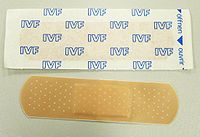
pH-sensitive nanocarriers for Ganoderma applanatum polysaccharide release via host–guest interactions
Sign Up to like & getrecommendations! Published in 2018 at "Journal of Materials Science"
DOI: 10.1007/s10853-018-2091-0
Abstract: In this work, a new kind of smart nanocarriers that combine pH-responsive delivery and fluorescent markings was developed. The smart nanocarriers were based on the host–guest interaction between beta-cyclodextrin (β-CD) and rhodamine (R) which has… read more here.
Keywords: gap; ganoderma applanatum; applanatum polysaccharide; polysaccharide ... See more keywords

Structural characterization and amelioration of sulfated polysaccharides from Ganoderma applanatum residue against CCl4-induced hepatotoxicity.
Sign Up to like & getrecommendations! Published in 2021 at "International immunopharmacology"
DOI: 10.1016/j.intimp.2021.107554
Abstract: Natural polysaccharides and their derivatives have attracted academic attention due to their extensive physiological activities. However, the hepatoprotective effects against carbon tetrachloride (CCl4) toxicity have not been well elucidated. The objectives of this study were… read more here.
Keywords: applanatum residue; ganoderma applanatum; ccl4 induced; ccl4 ... See more keywords

Lanostane-type triterpenoids from the fruiting bodies of Ganoderma applanatum.
Sign Up to like & getrecommendations! Published in 2019 at "Phytochemistry"
DOI: 10.1016/j.phytochem.2018.10.011
Abstract: Twelve previously undescribed lanostane-type triterpenoids, including three triterpenoids with a γ-lactone ring, namely applanlactones A‒C, four highly oxygenated lanostane triterpenoids, namely methyl applaniate A and applanoic acids B‒D, as well as five C21 nortriterpenoids, applanones… read more here.
Keywords: bodies ganoderma; fruiting bodies; lanostane; ganoderma applanatum ... See more keywords

Unified Total Synthesis of Diverse Meroterpenoids from Ganoderma Applanatum.
Sign Up to like & getrecommendations! Published in 2022 at "Organic letters"
DOI: 10.1021/acs.orglett.2c01633
Abstract: A unified approach to meroterpenoids applanatumols B, V, W, X, and Y produced by the medicinal fungus Ganoderma applanatum and 2'-epi-spiroapplanatumine O is presented. The key synthetic sequence consists of a tandem anionic ketone allylation/oxy-Cope… read more here.
Keywords: unified total; meroterpenoids ganoderma; diverse meroterpenoids; total synthesis ... See more keywords

Two rare meroterpenoidal rotamers from Ganoderma applanatum
Sign Up to like & getrecommendations! Published in 2017 at "RSC Advances"
DOI: 10.1039/c6ra26572c
Abstract: Applanatumols Z3 (1) and Z4 (2), two novel natural product hybrids consisting of a meroterpenoid and a glycerol and three known compounds (3–5) were isolated from the fruiting bodies of the fungus Ganoderma applanatum. Their… read more here.
Keywords: ganoderma applanatum; two rare; meroterpenoidal rotamers; rotamers ganoderma ... See more keywords

Plaster Gel Loaded with Silver Nanoparticle-Mediated Ganoderma applanatum: from Fabrication to Evaluation
Sign Up to like & getrecommendations! Published in 2023 at "AAPS PharmSciTech"
DOI: 10.1208/s12249-023-02566-z
Abstract: Traditional Asian remedies have mainly employed the macrofungus Ganoderma applanatum , which belongs to the family Ganodermataceae , as a medicinal mushroom due to its high antibacterial and antioxidant activity. Extracts of the fungus can… read more here.
Keywords: plaster; film; gel; plaster gel ... See more keywords

Antioxidant Properties of the Artist's Conk Medicinal Mushroom, Ganoderma applanatum (Agaricomycetes), upon Cultivation with para-Substituted Phenolic Compounds and Tea Leaf Extracts.
Sign Up to like & getrecommendations! Published in 2018 at "International journal of medicinal mushrooms"
DOI: 10.1615/intjmedmushrooms.2018026329
Abstract: In this study we elucidate antioxidative properties of the mushroom Ganoderma applanatum (Pers.) Pat. enhanced by submerged culture with para-hydroxyphenolic compounds and tea leaf extracts. The tea extract has been shown to increase to different… read more here.
Keywords: tea leaf; para substituted; ganoderma applanatum; mushroom ganoderma ... See more keywords

Anti-Adipogenic Lanostane-Type Triterpenoids from the Edible and Medicinal Mushroom Ganoderma applanatum
Sign Up to like & getrecommendations! Published in 2022 at "Journal of Fungi"
DOI: 10.3390/jof8040331
Abstract: Our previous research has shown that lanostane triterpenoids from Ganoderma applanatum exhibit significant anti-adipogenesis effects. In order to obtain more structurally diverse lanostane triterpenoids to establish a structure–activity relationship, we continued the study of lanostane… read more here.
Keywords: lanostane triterpenoids; anti adipogenesis; lanostane type; lanostane ... See more keywords

Effect of Methyl Jasmonate Elicitation on Triterpene Production and Evaluation of Cytotoxic Activity of Mycelial Culture Extracts of Ganoderma applanatum (Pers.) Pat.
Sign Up to like & getrecommendations! Published in 2023 at "Plants"
DOI: 10.3390/plants12020294
Abstract: Abiotic elicitation, a well-known strategy in mushroom biotechnology, promotes increased accumulation of secondary metabolites in mycelial cultures. The study aimed the effects of methyl jasmonate (MeJA) on the production of triterpenes in submerged cultures of… read more here.
Keywords: production; elicitation; cytotoxic activity; ganoderma applanatum ... See more keywords

THE ACTIVITY OF CELLULASE ENZYMES OF Ganoderma applanatum AND Ganoderma tropicum
Sign Up to like & getrecommendations! Published in 2017 at "journal of applied pharmaceutical science"
DOI: 10.7324/japs.2017.70419
Abstract: Background: Ganoderma can live as saprobes on rotting stumps and roots by decomposing lignin as well as cellulose and related polysaccharides. It is because of mushrooms cellulolytic activities. Objective: The aim of this study was… read more here.
Keywords: applanatum; cellulolytic activity; ganoderma applanatum; activity ... See more keywords